Overlanders usually use large vehicles, with either gas or diesel engines with low mpg’s.
While using hybrids or even electric vehicles for overlanding is still in the distant future (and those types of vehicles may not even be desired by the overlanding community), there are still several things that overlanders can do to decrease their impact on the environment.
— Please Click Here For The Infographic —
Travelers should preserve nature in a way for their children and grandchildren to enjoy as well.
While it is a fun, family activity, camping and overlanding have both positive and negative effects on the environment.
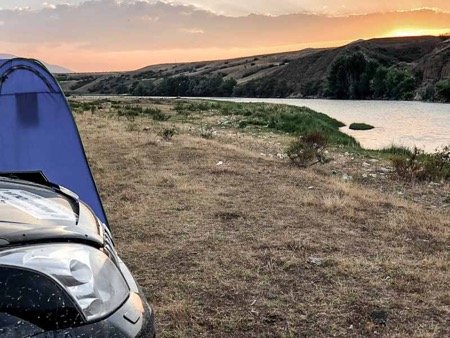
Camping is great for socialization since often there’s no technology around, and you have more interaction and communication with family and friends.
It also improves your mood and reduces stress. On the negative side, people may end up making campfires which can release toxic gases into the air and are harmful.
These toxic gases contain carbon monoxide and carbon dioxide, which both heavily pollute the air.
Ultimately, if the fire is not placed in an appropriate spot, it can often kill wildlife and even plant life in the area that you are camping in.
We’re not against campfires, we love them! But with moderation and with precautions.
Also, some people fall into the habit of leaving garbage and waste behind after their camping trips. This leftover trash can harm the animals because they may end up eating the garbage and choking on whatever waste is left behind, to only mention one of the downsides of such recklessness.
Ultimately what people need to remember is that how they live, shop and camp have an effect on the places that they journey actually to experience.
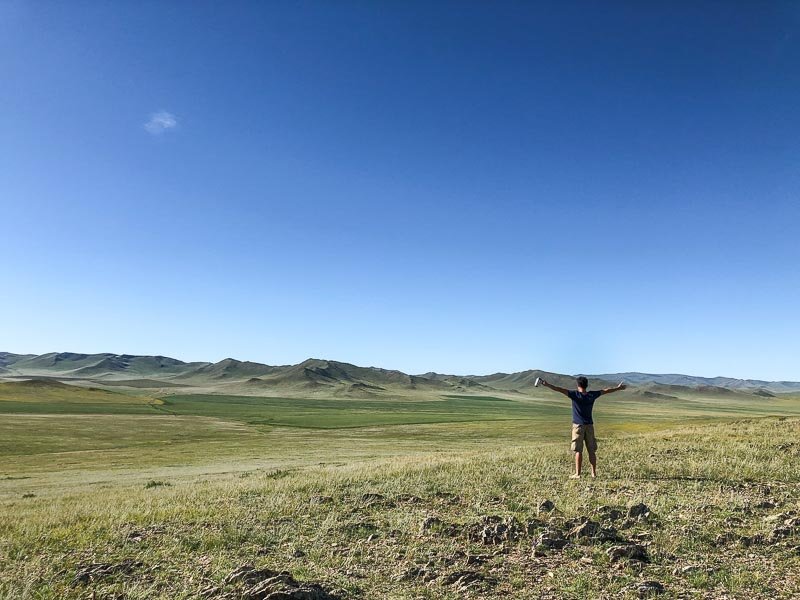
However, it’s never too late to start making positive choices such as using less water, pollutants, plastic, and fuel as well.
At the end of the day by creating an eco-friendly footprint, you’ll not only protect the wildlife and environment, but you’ll also save money in the interim.
During our travels, luckily literally no campers or overlanders we ever met were inconsiderate. Quite the opposite!
There seems to be a great trend among overlanders to really look after the environment, and many follow the awesome principle of “leave the campground cleaner than you found it“.
So let’s see, as overlanders and campers, what can we do for the environment. Here are thirteen habits that you may adopt in order to improve your stamp on the world.
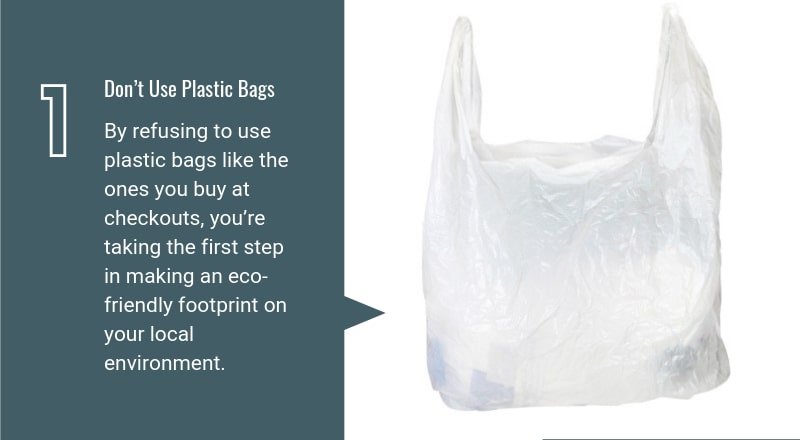
Don’t Use Plastic Bags
The best way to protect the environment is to stop using plastic bags. By refusing to use plastic bags like the ones you buy at checkouts, you’re taking the first step in making an eco-friendly footprint on your local environment.
The next step, however, is to choose plastic-free food and groceries. Always opt for items packaged in recyclable cardboard cartons, tins, bottles, and boxes as these are more environmentally friendly than plastic.
Furthermore, plastic is hard to recycle, and it is never really biodegradable.
You may also choose to switch to bleach-free paper products when it comes to household items. These are supplies such as paper towels and toilet rolls and pack your fruit and vegetables in drawstring bags made from mesh as opposed to plastic packets.
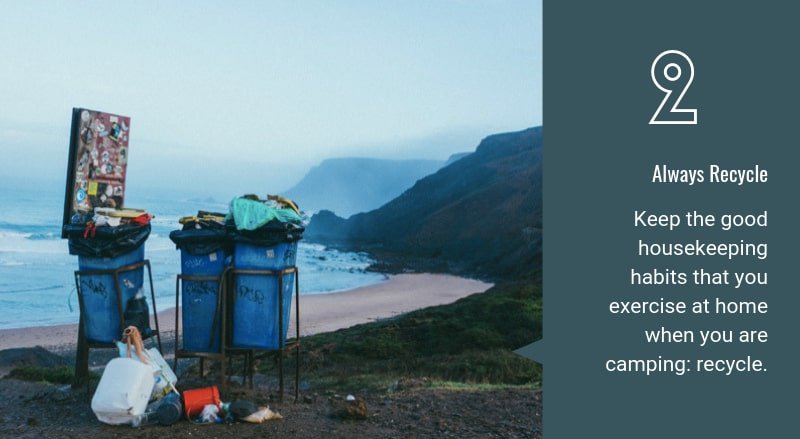
Always Recycle
It’s not always easy to find recycling bins in remote places; however, it’s not impossible either.
If you simply keep the good housekeeping habits that you exercise at home when you are camping, you’ll do your share to limit waste and your footprint on the environment.
So basically staying committed to recycling means that you have to keep your glass bottles, tins, cardboard and newspapers, and jars in your own bags until you reach town or home.
Ultimately, this is the best thing that you can do as a traveler and it also it forces you to account just how much waste you are responsible for on a daily or weekly basis.
Before making your way to your camping destination, remove and recycle as much packaging from your groceries as you possibly can.
So if space is limited and you are camping in a remote site, consider switching to aluminum, crushable beer cans, and compact wine casks as opposed to space-hogging glass bottles.
Another environmental nightmare is dead batteries dumped on the roadside. While it’s all too tempting to simply throw them on the side of the road and drive away, you should think twice about this.
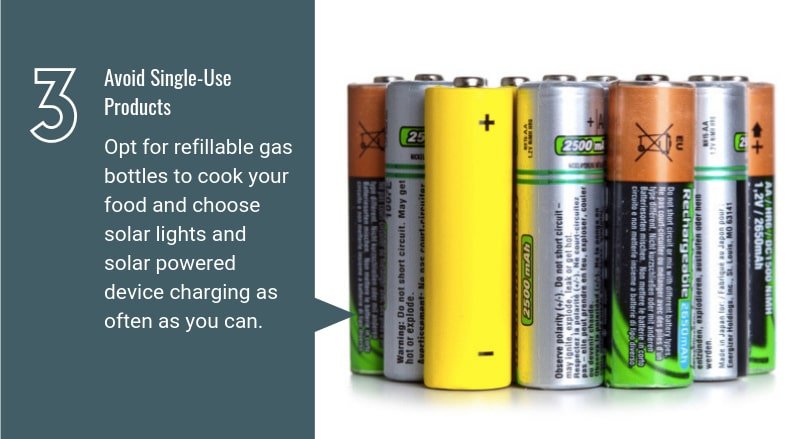
Avoid Single-Use Products
USB rechargeable gadgets, kinetic watches, and solar torches are all cutting-edge and mobile camping products that have been making disposable batteries a thing of the past.
However, everyone just needs to learn how to start using them.
This is the year to stop investing in single-use batteries and other once off only throwaway containers, especially the little butane stove canisters that seem to be very convenient.
We’re guilty of that too! It’s a habit we’re changing right now!
A good example where most people don’t realize the large amount of single plastic use is toiletries or anything similar, like cotton swabs!
We’ve switched over to only use reusable ones, such as the ones from Last Object:
They are extremely popular with travelers for quick stop cooking; however, they are incredibly harsh on the environment as well.
So instead opt for refillable gas bottles to cook your food and choose solar lights and solar powered device charging as often as you can.
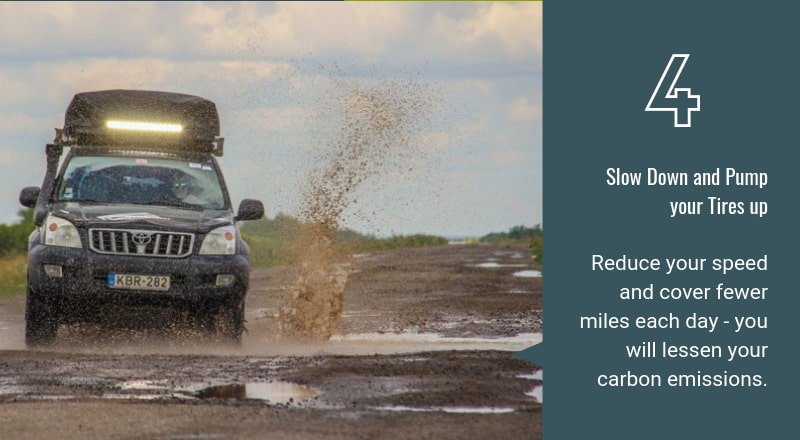
Slow Down and Pump your Tires up
You can save yourself a lot of money by simply using less fuel.
By simply reducing your speed and covering fewer miles each day, you will also lessen your carbon emissions. Also, do what you can to inspect your roof and reduce your vehicle’s drag.
By keeping your tires inflated to the maximum recommended pressure on the bitumen and having your vehicle regularly serviced, you’ll keep it running smoothly.
Also, try to opt for biodiesel (if your vehicle allows) as often as you can.
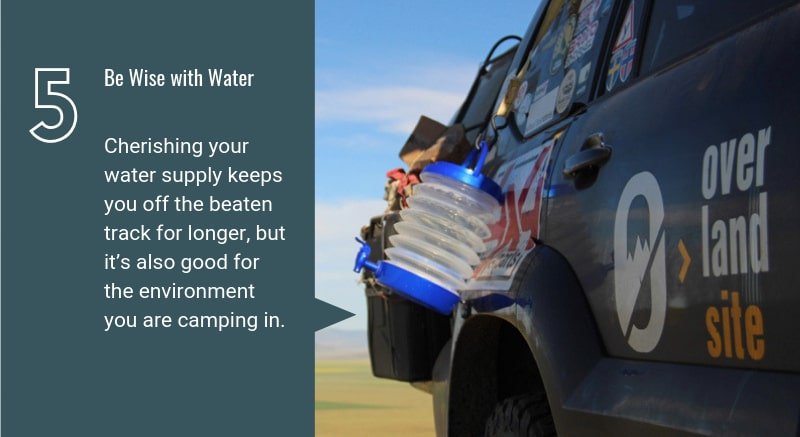
Be Wise with Water
Cherishing your water supply keeps you off the beaten track for longer, but it’s also good for the environment you are camping in.
By making peace with the dust in your rig, showering less, and saving your laundry for the next holiday park, you’re doing your part for a campsite and the environment.
Ultimately, by using a lesser amount of soap and shampoo, you also reduce the amount of time you’re spending in the shower and the amount of water you’re using and storing on board.
The amount of detergent being released into the environment would also be much less.
Some tips that you can apply while water hoarding is to install low-flow taps in your rig, water-saving showerheads, and always ensure that you catch a rain shower.
Have your vehicle rigged up to catch and channel rainwater directly into your water tank is a good idea.
Another tip while showering is to use a bucket at your feet to catch the water that flows while waiting for the hot water to kick in. Ultimately this can be used in your hand-operated washing machine.
Alternatively, for long-term usage consider modifying your rig to redirect the water from the sink and shower so it can be used to flush your toilet.
– Further tips from Sirocco Overland:
Featured Articles
Filter/Purify Water
“Do not buy water in plastic bottles. Before you leave ensure you have a sustainable water filter/purification system along with replacement filters and a back-up.
Even developed countries struggle with plastic recycling, do not increase the burden.
Fill your containers/bottles from mountain springs, streams, people’s homes etc and filter from there. We have had no issues with this since using a proper system (we do not recommend chlorine or iodine for longterm use).”
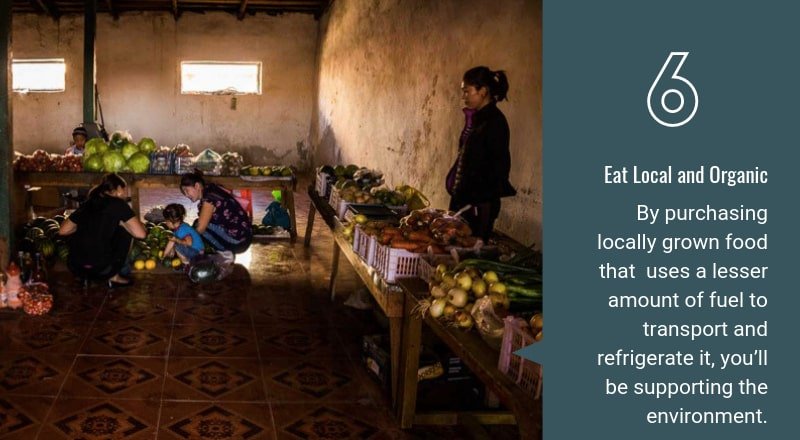
Eat Local and Organic
Always consider your foods fuel bill. By purchasing locally grown food that has fewer food miles and uses a lesser amount of fuel to transport and refrigerate it, you’ll be supporting the environment.
Consequently, you also enjoy more nutritious, fresh, and tasty produce while supporting local farmers wherever you go.
As much as possible, opt for healthier, organic food that makes use of fewer fossil fuels to produce.
Also, try to buy produce that uses no artificial fertilizers, energy-intensive pesticides, and chemical feeds. Produce that contributes less nitrogen into the environment is also recommended.
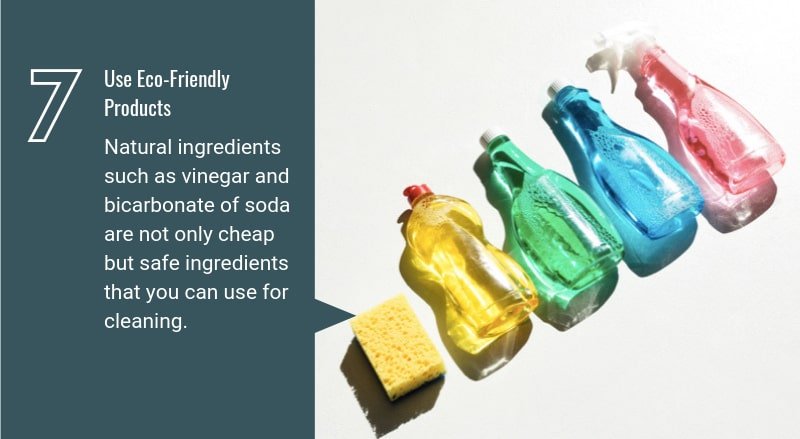
Use Eco-Friendly Products
This is the year that you should make a priority to switch to biodegradable and natural personal and washing products.
Products such as shampoo, soap, sunscreen as well as laundry and kitchen detergents.
Not only are biodegradable products healthier for you and your family, but they are also kinder on the environment.
Natural ingredients such as vinegar and bicarbonate of soda are not only cheap but safe ingredients as well.
They can be used to clean toilets, floors, showers as well as bench tops. All you need to do is spray any caravan surface with bicarbonate of soda and a blend of vinegar and water and watch it fizz.
After that simply wipe the residue off.
You can also choose to spray and wipe all hard surfaces in your RV with the vinegar mix and thereafter wipe with clove oil and one liter of water before leaving to dry.
This makes your hard surfaces mold resistant.
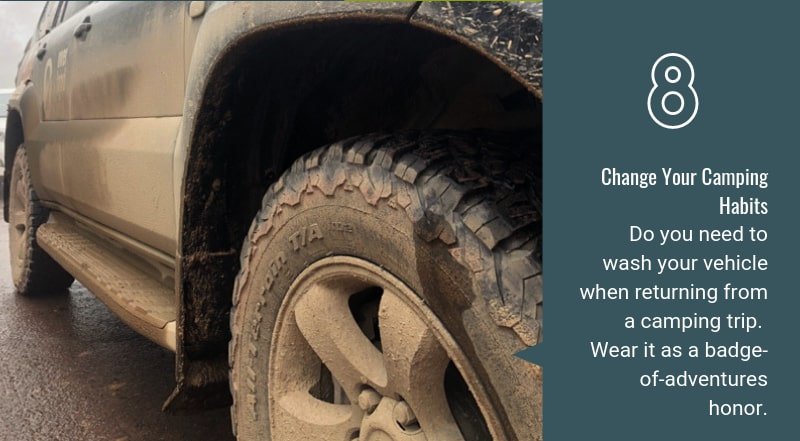
Change Your Camping Habits
Some people are under the impression that just because they are staying in an established campground with all the amenities and power access right at each site, they can forget their power saving habits.
Always ensure that you switch off the shower while you soap up your hair and body and press the half flush button on the toilet each time.
Never leave a tap running as it can drain up to 16 liters of water per minute from your tank when left unattended.
Switch off the valve while you brush your teeth as well.
Furthermore, consider whether you actually need to wash your vehicle when returning from a camping trip.
If you would rather wear it as a badge of adventures honor letting everyone know where you’ve been, that’s perfectly fine.
However, if you absolutely must wash our vehicle, use less detergent and more elbow grease to ensure that you reduce the amount of water needed to rinse off the soapy residue.
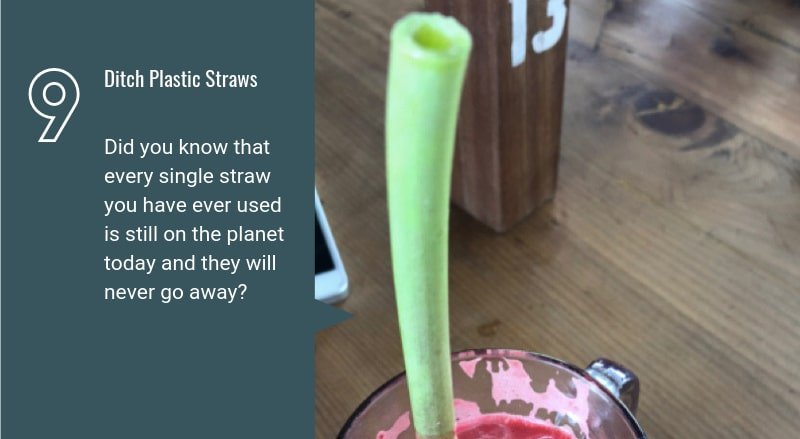
Ditch Plastic Straws
Did you know that every single straw you have ever used is still on the planet today and they will never go away?
So basically they will always accumulate. Research suggests that people use millions of straws each day, and it’s a big problem with a rather simple solution.
And that is merely leaving straws on the counter. However, straws make sipping on your favorite drinks more convenient, and this is why people use them.
The more environmentally safer alternative is bamboo straws.
Not only are they renewable and sustainable, but they are 100% compostable.
So if you are a smoothie or juice drinker, bamboo straws are easy to pack and most come with a thin cleaner.
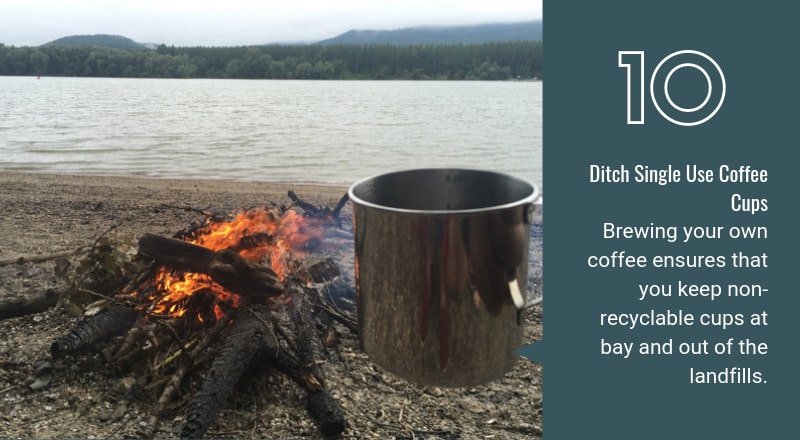
Ditch Single Use Coffee Cups
Perhaps one of the best and most earth-friendly things that campers do at 10:30 AM in the morning is stop to brew a cup of coffee.
Brewing your own coffee ensures that you keep non-recyclable cups at bay and out of the landfills.
You’ll be surprised at the number of cups you can keep out of the waste by simply making your own coffee in your own cup.
It is estimated that approximately 3 billion coffees are sold in disposable cups each year.
These cups are not biodegradable, and they leave behind a polyurethane lining that lives longer than you.
So if you do fancy a cup of coffee while you are on the road, you can always order one in a ceramic cup or mug and sit down and enjoy it.
And if you need to take some coffee away, simply hand the waitress your own reusable travel mug.
The best solution is, of course, is to make your own coffee in a remote place and just enjoy the moment!
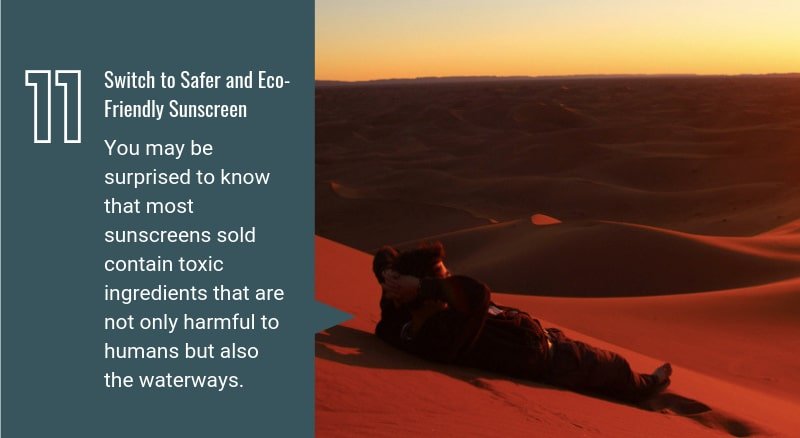
Switch to Safer and Eco-Friendly Sunscreen
Sunscreen is a campers best friend; however, you may be surprised to know that most sunscreens sold contain toxic ingredients that are not only harmful to humans but also the waterways.
If you check the back of your sunscreen bottle and you see ingredients such as oxybenzone or octinoxate, then your sunscreen is toxic.
In fact, these ingredients have recently been banned in states such as Hawaii as it was proven to damage and kill coral reefs.
Natural sunscreens make use of the zinc oxide to shield your skin from harmful solar rays. This ingredient is human safe, as well.
Using toxic sunscreen is also making showering dangerous as it washes off into the drains, which eventually end up in your waterways.
So the chemicals that you put on your skin also affects the environment.
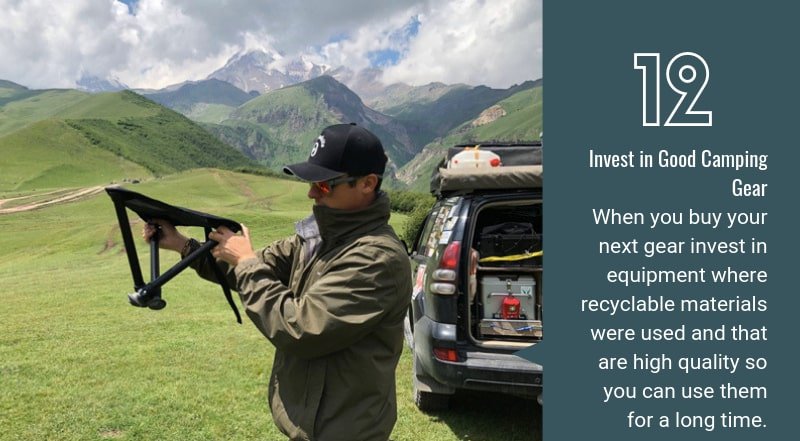
Invest in Good Camping Gear
Perhaps it may seem like a challenge to invest in proper camping gear since what’s good is never cheap, quality gear actually lasts the distance.
So ultimately you’ll save money in the long run. Furthermore, quality gear will never fail you when you need it the most.
Neither will it end up in a landfill sooner than it should. So make your goal for this year to invest in quality travel and overlanding gear, especially when it comes to clothing, footwear as well as portable fridges, kayaks, and car tires. Cry only once!
Spend your hard-earned cash wisely and invest in environmentally motivated equipment companies, such as Kupilka, that make use of recyclable materials that are not harsh on the environment and leave a small ecological print.
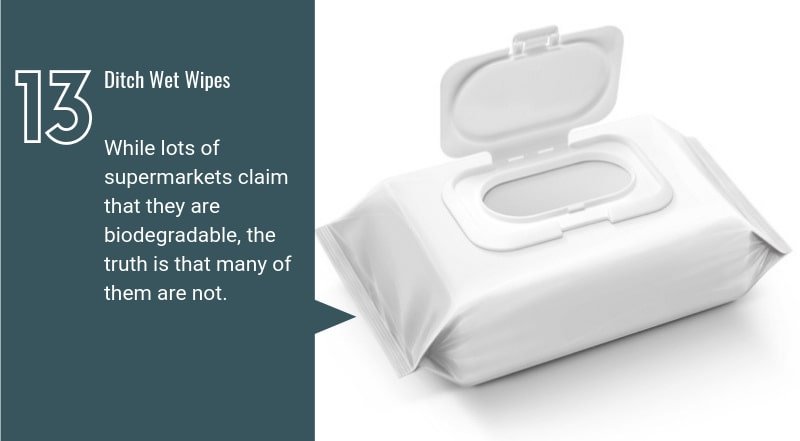
Ditch Wet Wipes
Using wet wipes are delightfully convenient. However, you may want to the rethink this convenience.
While lots of supermarkets claim that they are biodegradable, the truth is that many of them are not.
Most wet wipes end up in sewers after being flushed down the toilet and become what is known as fatbergs.
Unfortunately, the next destination for these wet wipes is the ocean where it will take approximately 100 years for them to break down or worse kill a sea creature that ingests it.
So an alternative which is biodegradable and environmentally friendly would be washable muslin cloth which is natural and also soap free.
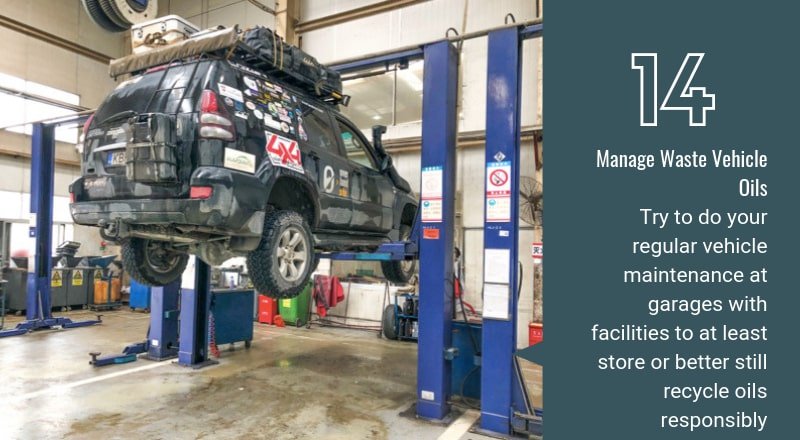
Manage Waste Vehicle Oils
Top tip from Sirocco Overland: “Probably the biggest problem for long-haul overland travel.
Try to plan your service intervals around large or even capital cities (usually when you’re waiting for visas), this may be the only place with facilities to at least store or better still recycle oils responsibly.
If your servicing yourself make sure you have oil spill mats and enough containers to carry/store the waste oil in. Try not to use soft drink or milk bottles as these will likely leak in the heat.
Take all spill mats/rags, old filters along with the oil for disposal.”
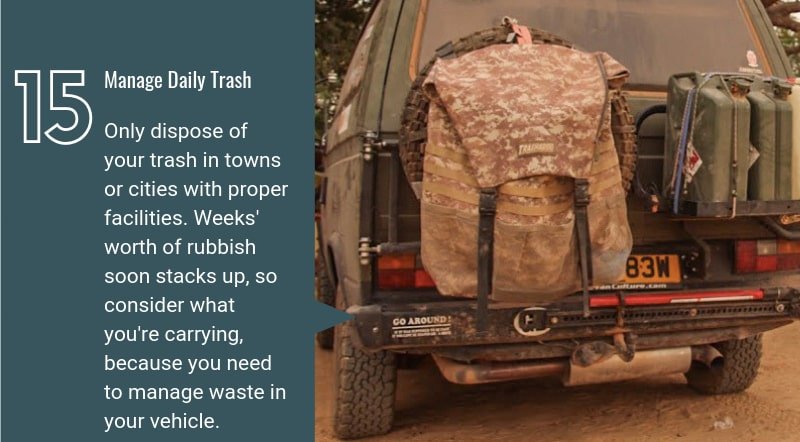
Manage Daily Trash
Top tip from Sirocco Overland: “Only dispose of this stuff in towns or cities with proper facilities. Depending on your destination you may be carrying out 3-4 weeks worth of rubbish and it soon stacks up.
Consider what you are carrying and the space it will take up after you are done with it. Tinned foods for example take up a lot of room and are not easy to crush.
Transfer suitable food types to ziplock bags for re-use later whilst your in a town/city to minimise carrying waste later on.
Consider your space for waste. We use a Trasharoo spare wheel trash bag. (Read the full Trasharoo Review here.) This keeps the waste and smells outside and can take a huge amount of bagged rubbish.
We took the time to separate this stuff out so we could easily handle and recycle when needed. We managed 3 weeks of waste in ours whilst in Mongolia easily.”
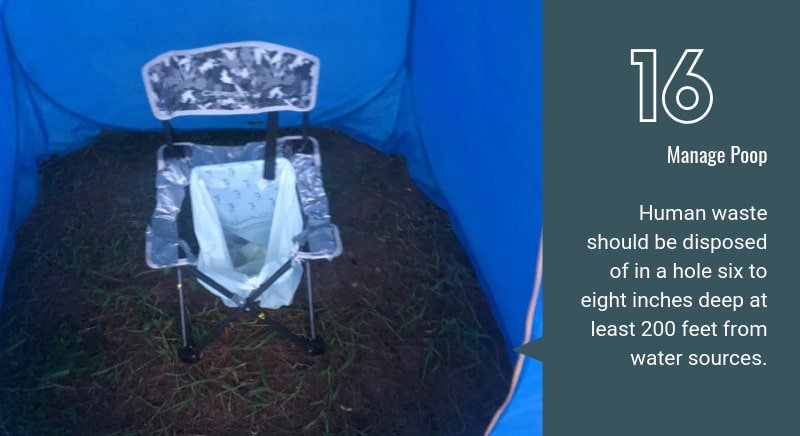
Manage Poop
Top tip from Sirocco Overland: “Yes, it was going to come up sooner or later. Realistically you cannot pack this out when overlanding so its the bury option.
Human waste should be disposed of in a shallow hole six to eight inches deep at least 200 feet from water sources. Cover and disguise the hole with natural materials.
It is recommended to pack out your toilet paper but again realistically you should burn this responsibly.
Don’t forget the hand gel afterwards!”
Alternatively, we’d also say that another option is to purchase (real) recycled and eco-friendly toilet paper that you can just also bury, so there is no need to burn it.
You can read our full guide on How to Poop in the Wilderness.
We had a modified camping chair that functioned as a toilet. Get yourself something similar and in remote areas you can enjoy a view in your most private moments!
If you don’t want to be viewed, though, use a shower tent over your modified camping chair for a full setup.
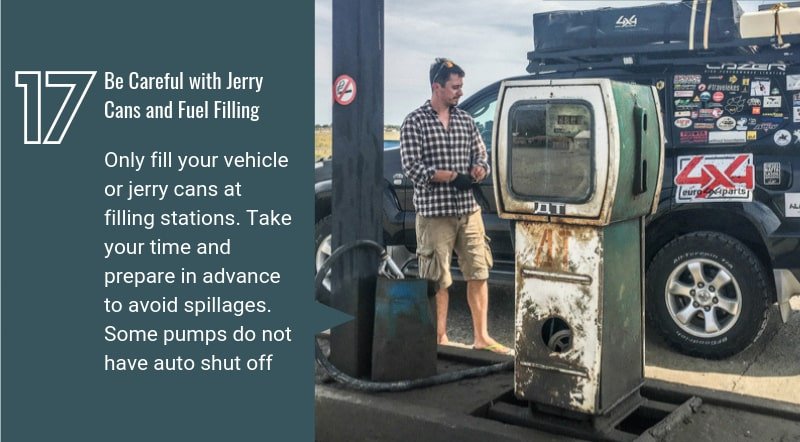
Be Careful with Jerry Cans and Fuel Filling
Top tip from Sirocco Overland: “Only fill your vehicle or jerry cans at filling stations. Take your time and prepare in advance to avoid spillages.
Some pumps do not have auto shutoff and will continue to run when you have your back turned. Line up your cans in advance with lids open and have your fuel cap(s) open ready.
Only used approved fuel cans for transport not plastic barrels.”
We also came across several gas stations where the equipment was from the Soviet era and the pumps didn’t have auto-shutoff.
Those can surprise you in a very nasty way, as one of our friends’ have experienced a full diesel-shower on one of our trips in 2014 in Uzbekistan.
In Conclusion
Camping is a wonderful way to de-stress and enjoy quality time with family and friends.
Thanks to beautiful and natural campsites, you are afforded the privilege of enjoying what Mother Nature has to offer.
Therefore, it is in your best interest and that of the generations to come that you try your utmost best to limit your impact on the environment.
Overlanding may not be the most environmentally friendly option while camping, however, there are dozens of good habits that you can start practicing to ensure that you limit your carbon footprint on nature.
If you liked this post and would like to raise awareness of what campers and overlanders can do, comment below and share the infographic on Facebook and pin it on Pinterest!



![17 Things You Can Change to Reduce Your Impact on the Environment While Overlanding [INFOGRAPHIC] 1 eco friendly travel](https://overlandsite.b-cdn.net/wp-content/uploads/2019/06/Eco-Friendly-Overlanding-Tips-cover-min-_1_-_1_.webp)
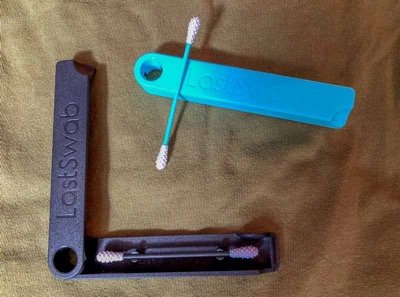
![17 Things You Can Change to Reduce Your Impact on the Environment While Overlanding [INFOGRAPHIC] 2 q? encoding=UTF8&ASIN=B07X36K6WR&Format= SL550 &ID=AsinImage&MarketPlace=US&ServiceVersion=20070822&WS=1&tag=dobosiconsulting 20&language=en US](http://ws-na.amazon-adsystem.com/widgets/q?_encoding=UTF8&ASIN=B07X36K6WR&Format=_SL550_&ID=AsinImage&MarketPlace=US&ServiceVersion=20070822&WS=1&tag=dobosiconsulting-20&language=en_US)

Quite a nice article! Here’s a couple more things to consider for the list that my family has opted to do over the years, as well as something new that we will be adding.
1 – compost: We compost at home so we do it while camping too. It’s always amazing to me how little trash you actually produce if you do the 3 things already mentioned (avoid single use products, by local organic food, and recycle), but when you add in composting… the actual amount of trash that goes to the landfill is rather small.
2 – extra trash bag: as a habit we always a few extra trash bags in our camp kit and we try to leave a camp site better then we found it. We do this in a variety of ways such as picking up any trash (sometimes we need gloves for the gross stuff), cleaning out fire pits that are full, removing rope/wire from trees that have been left from hunters hanging meat or others hanging tarps. The idea is to leave the campsite, as much as possible, in a way that will make the next person like they are the first person to ever be there. I know the goal is not possible in many situations, but the idea seems to be good guidance for us.
3 – groover: we haven’t done this one yet, but it is our next addition in the coming weeks. A groover is portable toilet that used by river runners. We camp regularly through spring, summer, and fall and I guess over the years I noticed how bad the human waste has become and even though we have a nice shovel and always dig an 8” deep cat hole, others do not. And one morning over a cup coffee before anyone else was awake it occurred to me that just packing out the families waste is a huge deal because of the number of nights that we camp. So, this will be our next step.
Bart, thank you for your input! These are awesome tips!
Skip unnecessary waste: Rather than buying freeze dried camping meals in single use packaging, buy them in bulk or larger multi-meal containers, and then repackage them yourself, if necessary, with old bread bags, etc. Also, avoid camp stoves with disposable fuel cartridges. Either get the refillable kind, or avoid buying a stove altogether and go with a DIY cat food tin stove using distilled alcohol. Cooks a little slower, but this has been our go-to system for years.
Thank you Alec. Multi-meal containers and in fact, anything that is bulk-packaged are a great tip. DYI cat food tin stove! Brilliant!
Awesome blog, thanks for the useful information.
Thank you very much for the invitation :). Best wishes.
PS: How are you? I am from France 🙂
Hi Markus! Thanks for your comment! We’re very good, currently adventuring in the Julian Alps. It’s wonderful!